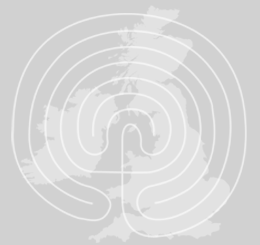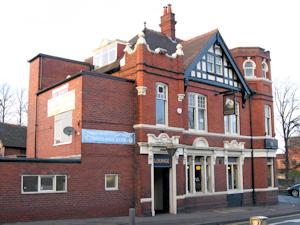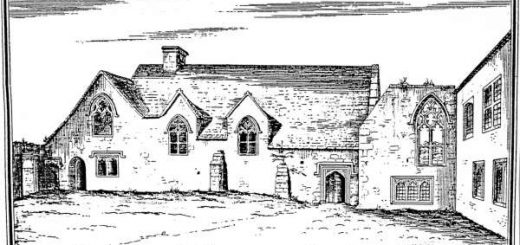Milford Haven
The following accounts appeared in ‘The Haunted Homes and Family Traditions of Great Britain by John Ingram (1897).
In July 1858, Mr. John Pavin Phillips, a well-known contributor to Notes and Queries, furnished that valuable publication with some instances of “Second Sight and Supernatural Warnings,” which had occurred either to himself, or to his most immediate relatives. The whole country of Pembroke, Mr. Pavin Phillips states, is rife with tales of this class, and, indeed, he might have added, every county of the three kingdoms as well, so universal and deeply-defined is the belief in them. From the stories, for the authenticity of which this gentleman vouches, may be cited the following.
“Many years ago, seven or eight members of the family of my paternal grandfather, were seated at the door of his house on a fine summer evening, between the hours of eight and nine o’clock. The parish church and its yard are only separated from the spot by a brook and a couple of meadows. The family happened to be looking in the direction of the churchyard, when they were amazed by witnessing the advent of a funeral procession. They saw the crowd, and the coffin borne on men’s shoulders come down the pathway towards the church, but the distance was too great to enable them to recognise the faces of any of the actors in the scene. As the funeral ‘cortege neared the church porch, they distinctly saw the clergyman, with whom they were personally acquainted, come out in his surplice to meet the mourners, and saw him precede them into the church. In a short time they came out, and my relatives saw them go to a particular part of the yard, where they remained for a time long enough to allow the remainder of the supposed funeral rites to he performed. Greatly amazed at what he beheld, my grandfather sent over to the church to inquire who had been buried at that unusual hour. The messenger returned with the intelligence that no person had been buried during that day, nor for several days before. A short time after this a neighbour died, and was buried in the precise spot where the phantom interment was seen.”
The whole of Mr. Pavin Phillips’s family would appear to have possessed the faculty of ghost-seeing, or rather to have been endowed with the capability, so well known among the Scotch, of Second Sight. In another instance of this power of foreseeing events his mother was the medium. Her father, says our authority, “lived on the banks of one of the many creeks or pills with which the beautiful harbour of Milford Haven is indented. In front of the house is a large court, built on a quay wall to protect it from the rising tide. In this court my mother was walking one fine evening, rather more than sixty years ago ” (this was written in 1858), ” enjoying the moonlight and the balmy summer breeze. The tide was out, so that the creek was empty. Suddenly my mother’s attention was aroused by hearing the sound of a boat coming up the pill; the measured dip of the oars in the water, and the noise of their revolution in the rowlocks, were distinctly audible. Presently she heard the keel of the boat grate on the gravelly beach by the side of the quay wall. Greatly alarmed, as nothing was visible, she ran into the house, and related what she had heard. A few days afterwards, the mate of an East Indiaman, which had put into Milford Haven for the purpose of undergoing repair, died on board, and his coffined corpse was brought up the pill, and landed at the very spot where my mother heard the phantom boat touch the ground.”
In the next incident of supernatural foresight related by Mr. Pavin Phillips, it is in a servant of the family that the power is manifested, so that it would appear as if the locality, rather than the dwellers in it, were haunted. He relates that in the year 1838 he was on a visit to his parents, “who, at that time, resided on the spot on which my mother was born, and where she passed the latter years of her life. Within a short distance of the house stood a large walled garden, which was approached through a gate leading into a stable-yard. From underneath the garden wall bubbled d well of delicious spring water, whence the domestic offices were supplied. It was a custom of the family, in the summer time, that the water for the use of the house should be brought in late in the evening, in order that it might be cool, and it was the duty of a servant to go out with a yoke and a couple of pails to fetch the water just before the time of closing up the house for the night. One evening the girl had gone out for this purpose; the night was beautifully fine, the moon shining so brightly that the smallest object was distinctly visible. Tho servant had not been absent many minutes when she ran into the house without her burden, and throwing herself into a chair in a state of extreme terror, fainted away. Restoratives having been used, she recovered a little and, upon being questioned as to the cause of her alarm, she told us that as she was stooping over the well, about to fill one of her pails, she suddenly found herself in the midst of a crowd of people who were carrying a coffin, which they had set down at the gate of the stable-yard. As she had received no intimation of the approach of the concourse by any sound of footsteps, she was greatly alarmed, and as the object borne by the throng did not tend to tranquillise her nerves, she took to her heels, leaving her pails behind her. As no persuasion could induce her to return to the well, I offered to do so for her, and to ascertain the cause of her terror. When I arrived at the stable-yard, there was neither coffin nor crowd to be seen, and upon asking a neighbour, whose cottage commanded a view of the well, whether she had seen a funeral go by, she put a stop to any further inquiry by asking me * who had ever heard of a funeral at ten o’clock at night? ‘ To which pertinent query I could only reply by stating what the servant professed to have seen. So the matter rested for a few weeks, when there occurred an unusually high tide in Milford Haven. The water rose above the level of the ordinary springs, filling the creek, and flowing into the court in front of the house. It only ebbed when it had reached the door. The roadway at the end of the pill was impassable. A person having died on the opposite side of the inlet a few days before this, the funeral took place on the morning of the high tide ; and as it was impossible to take the corpse to the parish church by the usual route, the bearers crossed the pill in a boat with the coffin and having laid it down at the gate of our stable – yard, remained there until the boat could bring over the remainder of the funeral concourse.”
The last instance of this insight into the future which we shall cite from Mr.Pavin Phillips’s highly suggestive and interesting communication, is the record of an incident of the character referred to which occurred to him himself, in the year 1848, upon his return home after several years’ absence. “A few days after my arrival,” he states, “I took a walk one morning in the yard of one of our parish churches through which there is a right of way for pedestrians. My object was a twofold one : firstly to enjoy the magnificent prospect visible from that elevated position ; and secondly, to see whether any of my friends or acquaintances who had died during my absence were buried in the locality. After gazing around me for a short time, I sauntered on, looking at one tombstone and then at another, when my attention was arrested by an altar-tomb enclosed within an iron railing. I walked up to it, and read an inscription which informed me that it was in memory of Colonel. This gentleman had been the assistant Poor Law Commissioner for South Wale*, and while on one of his periodical tours of inspection, he was seized with apoplexy in the workhouse of my native town, and died in a few hours. This was suggested to my mind as I read the inscription on the tomb, as the melancholy event occurred during the period of my absence, and I was only made cognisant of the fact through the medium of the local press. Not being acquainted with the late Colonel , and never having even seen him, the circumstances of his sudden demise had long passed from my memory, and were only revived by my thus viewing his tomb. I then passed on, and shortly afterwards returned home. On my arrival my father asked me in what direction I had been walking ? I replied, In churchyard, looking at the tombs, and among others I have seen the tomb of Colonel , who died in the workhouse.’ ‘That,’ replied my father, ‘is impossible, as there is no tomb erected over Colonel ‘s grave/ At this remark I laughed. ‘ My dear father/ said I, ‘ you want to persuade me that I cannot read. I was not aware that Colonel was buried in the churchyard, and was only informed of the fact by reading the inscription on the tomb.’ * Whatever you may say to the contrary,’ said my father, ‘ what I tell you is true, there is no tomb over Colonel ‘s grave. Astounded by the reiteration of this statement, as soon as I had dined I returned to the churchyard, and again inspected all the tombs having railings round them, and found that my father was right. There was not only no tomb bearing the name of Colonel , but there was no tomb at all corresponding in appearance with the one I had seen. Unwilling to credit the evidence of my own senses, I went to the cottage of an old acquaintance of my boyhood, who lived outside of the churchyard gate, and asked her to show me the place where Colonel lay buried. She took me to the spot, which was a green mound, undistinguished in appearance from the surrounding graves. Nearly two years subsequent to this occurrence, surviving relatives erected an altar-tomb, with a railing round it, over the last resting-place of Colonel , and it was, as nearly as I could remember, an exact reproduction of the memorial of my day-dream.”
Verily, “there are more things in heaven and earth than are dreamt of in your philosophy ,”




Recent Comments